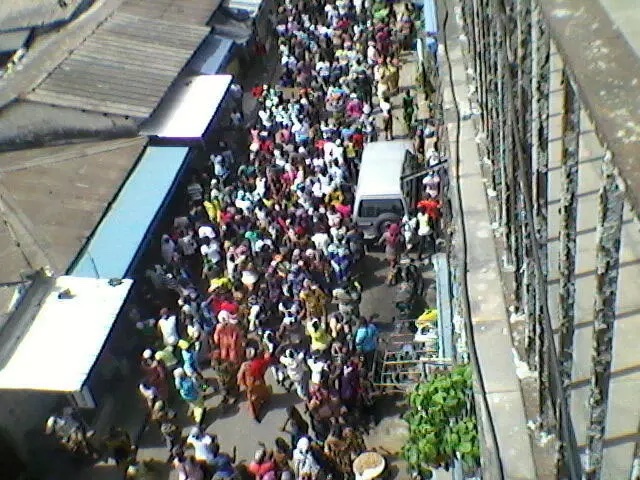
On Thursday, March 3, 2011, there was a women’s march for peace in Abobo, a suburb of Abidjan, in Côte d’Ivoire. This was not the first women’s peace march in Côte d’Ivoire. In the past weeks, the violence of the `stalemate’ has both increased and intensified. Neighborhoods are regularly tear gassed, houses invaded, men taken off. One side attacks, the other responds with either greater force or at the very least with the threat of greater force. Barricades are met with tanks, tanks are met with paving stones or with petrol bombs. Blood flows, and then more blood flows.
The women of Côte d’Ivoire have lived through this. They have lived through the intensification and expansion of violence before. They have lived through the increase and intensification of sexual violence as well. They have experienced rape used as a weapon of war, in not so distant times of `civil strife’ and of `national stalemate’.
The women of Côte d’Ivoire have lived through incarceration at the infamous Maison d’Arrêt et de Correction, or MACA, reputed to be one of the worst on the African continent. They have lived through the torture, the massacres, the brutality, the lethal conditions of MACA, where any sentence is a virtual death sentence. They have lived through the brief improvement of conditions, only to see them deteriorate into even worse depravity. The women of Côte d’Ivoire know the meaning of `civil strife’, of `national stalemate’, of mass and targeted detention.
And so they have organized. They have organized women’s marches, peaceful marches, marches of peace.
The women march because they do not want to become the mourning mothers, nor do they want to become the grieving widows. They know there is an alternative. They march for an immediate cessation of the violence, in their own names, in the names of their children and of their partners.
Last Friday, February 25, 2011, the women of Treichville, a district of Abidjan, organized a march. They marched “to liberate our husbands and children.” Five hundred or so women marched, with whistles, banging pots and pans. They were followed by the security forces. Men armed to the teeth surrounded the women on both sides. The women sat down in the street then, and shouted, “”Tirez-nous dessus, qu’on en finisse!” Roughly translated: “Attack us then, and be done with it.” And with that, the women took off their clothes. They sat in the street, naked, and dared the police, the armed forces, the paramilitaries, to come forward. They sat naked in the street, and they said, “So much blood has flowed. We have nothing to lose. We are not afraid to die. We are not afraid of you. We are not afraid of men with guns.”
Six days later, on Thursday, the women of Abobo took to the streets.
Suddenly, tanks appeared, men with guns appeared, gunfire exploded, women ran for shelter, and seven fell, dead. According to one eyewitness, “We were slaughtered. Eight women, including a pregnant woman, were killed on the spot. During the shooting, a bullet blew open the head of one of the victims. It was the first time I had seen someone’s brains out. As for the pregnant woman, her belly literally exploded. We have no idea why they shot at us. We were just a gathering of women, nothing else but women.”
Men with guns, men with tanks, fear women with whistles and pots and pans. Men with guns fear women’s autonomy, they fear an alternative to the exclusive power of violence. Why else would they murder the innocents? The murdered women of Côte d’Ivoire continue to march, continue to blow their whistles and bang on their pots and pans, continue to sit down in the streets, continue to strip naked, continue to demand their bodies be recognized, continue to demand the peace of justice, the justice of peace. Those women, the women of Côte d’Ivoire, haunt the world.
(Photo Credit: France 24 / AldoLaClass)